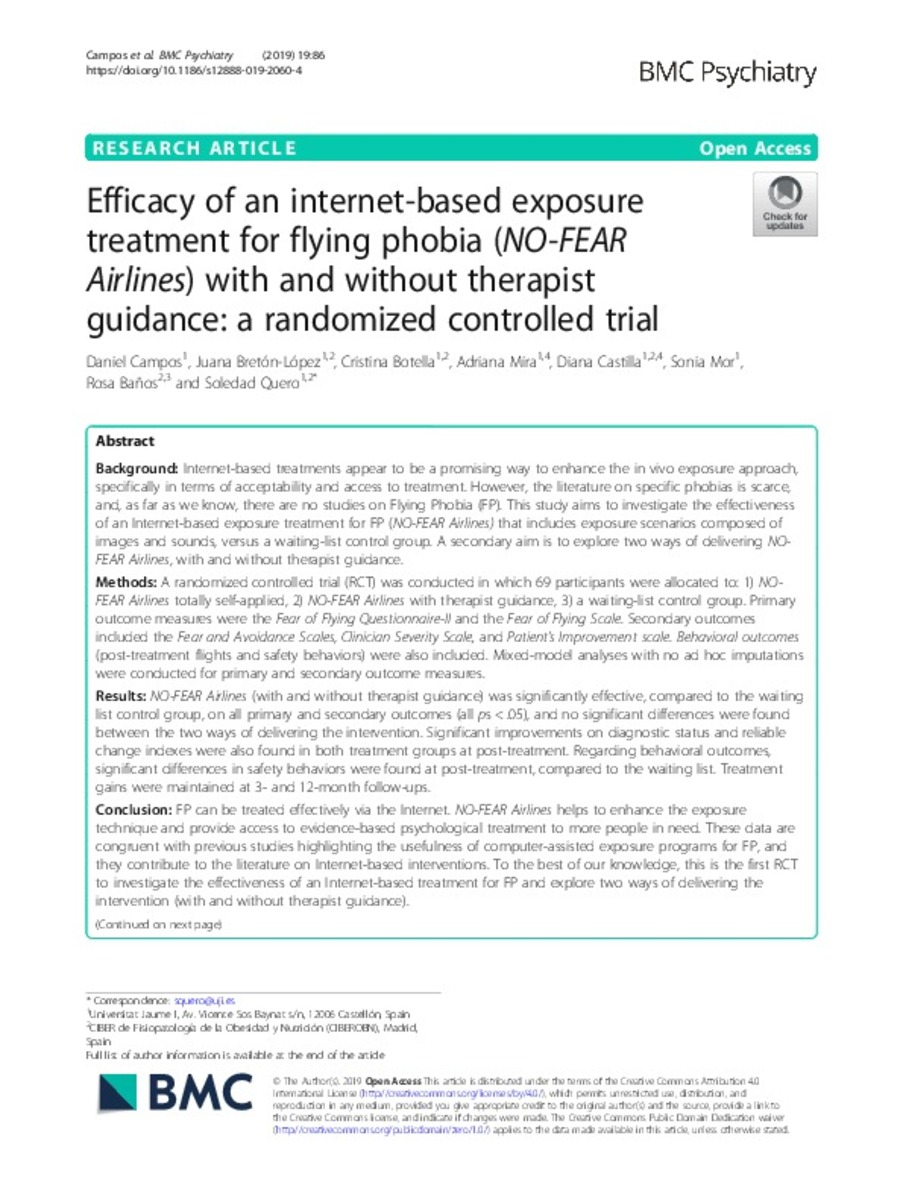Mostrar el registro sencillo del ítem
Efficacy of an internet-based exposure treatment for flying phobia (NO-FEAR Airlines) with and without therapist guidance: a randomized controlled trial
| dc.contributor.author | Campos, Daniel | |
| dc.contributor.author | Bretón-López, Juana | |
| dc.contributor.author | Botella, Cristina | |
| dc.contributor.author | Mira, Adriana | |
| dc.contributor.author | Castilla, Diana | |
| dc.contributor.author | Mor, Sonia | |
| dc.contributor.author | Baños, Rosa Maria | |
| dc.contributor.author | Quero, Soledad | |
| dc.date.accessioned | 2019-05-16T11:08:48Z | |
| dc.date.available | 2019-05-16T11:08:48Z | |
| dc.date.issued | 2019-03-06 | |
| dc.identifier.citation | CAMPOS, Daniel, et al. Efficacy of an internet-based exposure treatment for flying phobia (NO-FEAR Airlines) with and without therapist guidance: a randomized controlled trial. BMC psychiatry, 2019, vol. 19, no 1, p. 86 | ca_CA |
| dc.identifier.issn | 1471-244X | |
| dc.identifier.uri | http://hdl.handle.net/10234/182513 | |
| dc.description.abstract | Background: Internet-based treatments appear to be a promising way to enhance the in vivo exposure approach, specifically in terms of acceptability and access to treatment. However, the literature on specific phobias is scarce, and, as far as we know, there are no studies on Flying Phobia (FP). This study aims to investigate the effectiveness of an Internet-based exposure treatment for FP (NO-FEAR Airlines) that includes exposure scenarios composed of images and sounds, versus a waiting-list control group. A secondary aim is to explore two ways of delivering NO-FEAR Airlines, with and without therapist guidance. Methods: A randomized controlled trial (RCT) was conducted in which 69 participants were allocated to: 1) NO-FEAR Airlines totally self-applied, 2) NO-FEAR Airlines with therapist guidance, 3) a waiting-list control group. Primary outcome measures were the Fear of Flying Questionnaire-II and the Fear of Flying Scale. Secondary outcomes included the Fear and Avoidance Scales, Clinician Severity Scale, and Patient’s Improvement scale. Behavioral outcomes (post-treatment flights and safety behaviors) were also included. Mixed-model analyses with no ad hoc imputations were conducted for primary and secondary outcome measures. Results: NO-FEAR Airlines (with and without therapist guidance) was significantly effective, compared to the waiting list control group, on all primary and secondary outcomes (all ps < .05), and no significant differences were found between the two ways of delivering the intervention. Significant improvements on diagnostic status and reliable change indexes were also found in both treatment groups at post-treatment. Regarding behavioral outcomes, significant differences in safety behaviors were found at post-treatment, compared to the waiting list. Treatment gains were maintained at 3- and 12-month follow-ups. Conclusion: FP can be treated effectively via the Internet. NO-FEAR Airlines helps to enhance the exposure technique and provide access to evidence-based psychological treatment to more people in need. These data are congruent with previous studies highlighting the usefulness of computer-assisted exposure programs for FP, and they contribute to the literature on Internet-based interventions. To the best of our knowledge, this is the first RCT to investigate the effectiveness of an Internet-based treatment for FP and explore two ways of delivering the intervention (with and without therapist guidance). | ca_CA |
| dc.format.extent | 16 p. | ca_CA |
| dc.format.mimetype | application/pdf | ca_CA |
| dc.language.iso | eng | ca_CA |
| dc.publisher | BMC | ca_CA |
| dc.relation.isPartOf | BMC psychiatry, 2019, vol. 19, no 1 | ca_CA |
| dc.rights | Atribución 4.0 Internacional | * |
| dc.rights.uri | http://creativecommons.org/licenses/by-sa/4.0/ | * |
| dc.subject | internet-based exposure | ca_CA |
| dc.subject | therapist guidance | ca_CA |
| dc.subject | randomized controlled trial | ca_CA |
| dc.subject | flying phobia | ca_CA |
| dc.subject | self-help | ca_CA |
| dc.title | Efficacy of an internet-based exposure treatment for flying phobia (NO-FEAR Airlines) with and without therapist guidance: a randomized controlled trial | ca_CA |
| dc.type | info:eu-repo/semantics/article | ca_CA |
| dc.identifier.doi | https://doi.org/10.1186/s12888-019-2060-4 | |
| dc.relation.projectID | Ministerio de Economía y Competitividad (Spain) (Plan Nacional I + D + I. PSI2013–41783-R); Red de Excelencia (PSI2014–56303-REDT) PROMOSAM: Research in processes, mechanisms and psychological treatments for mental health promotion from the Ministerio de Economía y Competitividad (2014); PSI2014–54172-R (15I229); CIBER: CIBER Fisiopatología de la Obesidad y Nutrición (ISCIII); Plan de promoción a la investigación UJI (16I336.01/1); and a PhD grant from Generalitat Valenciana (VALi+d) (ACIF/2014/320) | ca_CA |
| dc.rights.accessRights | info:eu-repo/semantics/openAccess | ca_CA |
| dc.relation.publisherVersion | https://bmcpsychiatry.biomedcentral.com/articles/10.1186/s12888-019-2060-4 | ca_CA |
| dc.type.version | info:eu-repo/semantics/publishedVersion | ca_CA |
Ficheros en el ítem
Este ítem aparece en la(s) siguiente(s) colección(ones)
-
PSB_Articles [1292]
Articles de publicacions periòdiques








